Sukhoi Su-30
| Su-30 | |
|---|---|
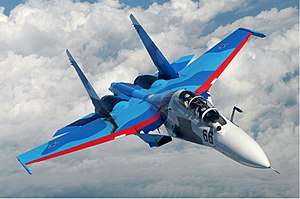 | |
| A Russian Air Force Su-30 | |
| Role | Multirole fighter[1] |
| Manufacturer | Sukhoi |
| First flight | 31 December 1989 |
| Introduction | 1996 |
| Status | In service |
| Primary users | Russian Air Force Algerian Air Force Venezuelan Air Force Vietnam People's Air Force |
| Produced | 1992–present |
| Number built | 630+[2][3][4][5][6] |
| Unit cost | |
| Developed from | Sukhoi Su-27 |
| Variants | Sukhoi Su-30MKI Sukhoi Su-30MKK Sukhoi Su-30MKM |
The Sukhoi Su-30 (Russian: Сухой Су-30; NATO reporting name: Flanker-C) is a twin-engine, two-seat supermaneuverable fighter aircraft developed by Russia's Sukhoi Aviation Corporation. It is a multirole fighter for all-weather, air-to-air and air-to-surface deep interdiction missions.
The Su-30 started out as an internal development project in the Sukhoi Su-27 family by Sukhoi. The design plan was revamped and the name was made official by the Russian Defense Ministry in 1996. Of the Flanker family, the Su-27, Su-30, Su-33, Su-34 and Su-35 have been ordered into limited or serial production by the Defense Ministry. Only the Su-37 remained a prototype. The Su-30 has two distinct version branches, manufactured by competing organisations: KnAAPO and the Irkut Corporation, both of which come under the Sukhoi group's umbrella.
KnAAPO manufactures the Su-30MKK and the Su-30MK2, which were designed for and sold to China, and later Indonesia, Uganda, Venezuela, and Vietnam. Due to KnAAPO's involvement from the early stages of developing Su-35, these are basically a two-seat version of the mid-1990s Su-35. The Chinese chose an older but lighter radar so the canards could be omitted in return for increased payload. It is a fighter with both air supremacy and attack capabilities, generally similar to the U.S. F-15E.[8]
Irkut traditionally served the Soviet Air Defense and, in the early years of Flanker development, was given the responsibility of manufacturing the Su-27UB, the two-seat trainer version. When India showed interests in the Su-30, Irkut offered the multirole Su-30MKI, which originated as the Su-27UB modified with avionics appropriate for fighters. Along with its ground-attack capabilities, the series adds features for the air-superiority role, such as canards, thrust-vectoring, and a long-range phased-array radar. Its derivatives include the Su-30MKM, MKA, and SM for Malaysia, Algeria, and Russia, respectively. The Russian Air Force operates several Su-30s and has ordered the Su-30SM version.
Development
While the original Su-27 had good range, it still did not have enough range for the Soviet Air Defense Forces (PVO, as opposed to VVS – the Soviet Air Force). The Air Defense Forces needed to cover the vast expanse of the Soviet Union. Hence, development began in 1986 on the Su-27PU, an improved-capability variant of the Su-27 capable of serving as a long-range interceptor or airborne command post.[9]
The two-seat Su-27UB combat trainer was selected as the basis for the Su-27PU, because it had the performance of a single-seat Su-27 with seating for two crew members. A "proof-of-concept" demonstrator flew 6 June 1987, and this success led to the kick-off of development work on two Su-27PU prototypes. The first Su-27PU flew at Irkutsk on 31 December 1989, and the first of three pre-production models flew on 14 April 1992.[10]
Design
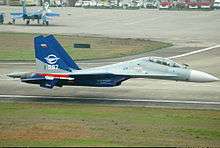
The Su-30 is a multirole fighter. It has a two-seat cockpit with an airbrake behind the canopy.
Flight characteristics
The integrated aerodynamic configuration, combined with the thrust vectoring control ability, results in high manoeuvrability and unique takeoff and landing characteristics. Equipped with a digital fly-by-wire system, the Su-30 is able to perform some very advanced manoeuvres, including the Pugachev's Cobra and the tailslide. These manoeuvers quickly decelerate the aircraft, causing a pursuing fighter to overshoot, as well as breaking a Doppler radar-lock, as the relative speed of the aircraft drops below the threshold where the signal registers to the radar.[11]
Powerplant
The aircraft's powerplant incorporates two Saturn AL-31F afterburning low-bypass turbofan engines, fed through intake ramps. Two AL-31Fs, each rated at 123 kN (28,000 lbf) of full afterburning thrust ensures Mach 2 in level flight, 1,350 km/h speed at low altitude, and a 230 m/s climbing rate.
With a normal fuel reserve of 5,270 kg, the Su-30MK is capable of performing a 4.5-hour combat mission with a range of 3,000 km. An aerial refueling system increases the range to 5,200 km (3,200 mi) or flight duration up to 10 hours at cruise altitudes.[12][13]
Avionics
The aircraft features autopilot ability at all flight stages including low-altitude flight in terrain-following radar mode, and individual and group combat employment against air and ground/sea-surface targets. Automatic control system interconnected with the navigation system ensures route flight, target approach, recovery to airfield and landing approach in automatic mode.
Operational history
Syria
Several Su-30SMs were sent to Syria in the Russian military intervention in Syria to escort and provide target illumination for bombers that launch airstrikes against Islamist rebel groups.[14][15] Su-30SM fighters were reportedly delivered to the Bassel Al-Assad International Airport in Latakia, Syria in September 2015. At least four Su-30SM fighters were spotted in a satellite photo.[16] In late December 2015, there were 16 Su-30SMs at Khmeimim Air Base.[17]
Su-30SM were initially tasked with aerial escort of Russian attack jets or strategic bombers. Later during the operations, they were tasked to air to ground duties too. On 21 March 2017, rebel forces launched a new offensive in the Hama province; a few days later a video emerged showing a Russian Air Force Su-30SM striking ground targets with unguided air to ground rockets in a dive attack against the rebels.[18]
On 3 May 2018, a Russian Air Force Su-30 crashed shortly after take-off from the Khmeimim Air Base, killing both crew members.[19]
Potential operators
Thailand formally requested information for the possible acquisition of the Su-30MK/MK2. However, the Saab Gripen was procured instead.[20]
In January 2016, Armenian Defense Minister Seyran Ohanyan mentioned that Russia had discussed the possibility of supplying Su-30 fighters to Armenia during a four-day Russian-Armenian intergovernmental commission on bilateral military-technical cooperation.[21]
In February 2016, Russia and Belarus concluded a preliminary agreement that would see the export of an undisclosed number of Su-30s to Belarus.[22]
Iran's defense minister announced in February 2016 that the country intends to buy an undisclosed number of the Su-30SM fighters.[23]
Variants

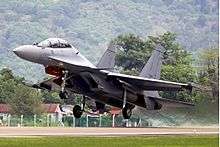
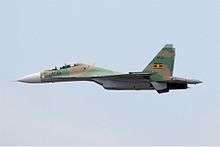

Early variants
- Su-30
- Modernized Su-27UB. 5 units operated by the Russian Air Defence Forces.
- Su-30K
- Commercial (export) version of the basic Su-30. The Indian Air Force briefly operated some Su-30Ks in the late 1990s.
- Su-30KI
- Sukhoi proposal for upgrading Russian AF single seat Su-27S. Also proposed export version for Indonesia, 24 were ordered but subsequently cancelled due to the 1997 Asian Financial Crisis.[24]
- Su-30KN
- Upgrade project for operational two-seat fighters, the Su-27UB, Su-30 and Su-30K. This was cancelled in Russia but later revived as Su-30M2. Belarus consider updating ex-Indian Su-30K to the Su-30KN standard.[25]
- Su-30MK
- Commercial version of Su-30M first revealed in 1993. Export versions include navigation and communication equipment from Hindustan Aeronautics Limited.[26]
Su-30MKI and derivatives
- Su-30MKI
- MKI stands for "Modernizirovannyi, Kommercheskiy, Indiski" meaning "Modernized, Commercial, Indian". Jointly developed with Hindustan Aeronautics Limited for the Indian Air Force. It is the first Su-30 family member to feature thrust vectoring control (TVC) and canards. Equipped with a multinational avionics complex sourced from Russia, India, France and Israel.[27]
- Su-30MKA
- A version of the Su-30MKI, except with French and Russian avionics for Algeria.[28]
- Su-30MKM
- A derivative of the India-Russian Su-30MKI,[29] the MKM is a highly specialised version for Royal Malaysian Air Force. It includes thrust vectoring control (TVC) and canards but with avionics from various countries. It will feature head-up displays (HUD), navigational forward-looking IR system (NAVFLIR) and Damocles Laser Designation pod (LDP) from Thales Group of France, MAW-300 missile approach warning sensor (MAWS), RWS-50 RWR and laser warning sensor (LWS) from SAAB AVITRONICS (South Africa)[30] as well as the Russian NIIP N011M Bars Passive electronically scanned array radar, electronic warfare (EW) system, optical-location system (OLS) and a glass cockpit.[31]
- Su-30SM
- A specialised version of the thrust-vectoring Su-30MKI and MKM variants for the Russian military, produced by the Irkut Corporation.[32][33] Russia's Defence Ministry was impressed with the MKI's performance envelope and ordered 30 Su-30SMs, a localised version of Su-30MKI, for the Russian Air Force.[34]
- The Su-30SM (SM for Serial, Modernized) (Flanker-H by NATO classification) is considered a 4+ generation fighter jet.[35][36][37][38][39][40] The aircraft has been upgraded according to Russian military requirements for radar, radio communications systems, friend-or-foe identification system, ejection seats, weapons, and other aircraft systems.[41][42] It is equipped with the N011M Bars radar with a maximum detection range 400 km, search range 200 km using a phased array antenna, frontal horizontal fins and steerable thrusters for supermaneuverability as well as with wide-angle HUD. The aircraft can be used to gain air supremacy same as for targeting adversary on the ground using wide range of weapons including air-to-air, air-to-surface and guided and unguided bombs with total weapons weight up to 8000 kg. It is also equipped with the one barrel, 30 mm GSh-30-1 autocannon. To ensure operations at major distances from airfield, the ability of in-flight refueling (IFR) is included.[33][42][43][44][45][46][47] Besides that, for electronic warfare purposes two SAP-518 jamming pods can be fitted on the wing tips. The SAP-518 is designed to protect the aircraft from various air-to-air and surface-to-air missiles by creating false targets, jamming missile's guidance, enemy aircraft radars or ground and seaborne air defence.[48] The first contract for 60 aircraft was signed in March 2012 with delivery to be completed by 2016.[49] On 21 September 2012, the Su-30SM performed its maiden flight.[50] On 12 January 2018, the Su-30SM was officially accepted into service with the Russian Aerospace Forces by a resolution of the Russian president.[51]
- Su-30SME
- Proposed export version of Su-30SM unveiled at the Singapore Airshow 2016.[52]
Su-30MKK and derivatives
- Su-30MKK
- Export version for China. MKK stands for Modernizirovannyi, Kommercheskiy, Kitayski or "Modernized, Commercial, China".[53] Its NATO codename is 'Flanker-G'.
- Su-30MK2
- Modernized Su-30MKK for China, Indonesia and Uganda with advanced avionics and weapons.
- Su-30MK2V
- Su-30MK2 variant for Vietnam with minor modifications.[54]
- Su-30MKV
- Export version of Su-30MK2 for Venezuela.
- Su-30M2
- A version from manufacturer KnAAPO based on the Su-30MK2. The Russian Air Force placed an initial order for the variant in 2009. Factory tests were completed in September 2010.[55][56][57] Twenty aircraft have been ordered; 4 in 2009 and 16 in 2012.[58] At least 12 have been produced as of August 2014, all four from the first contract in 2009, and eight from the second contract of 2012.[58] They are mostly to be used as combat training aircraft for upgraded Su-27SM fighters.
- Su-30MK3
- A proposed version with Phazotron Zhuk-MSF radar.
Operators
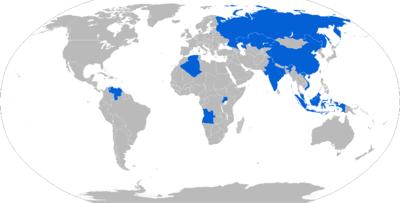

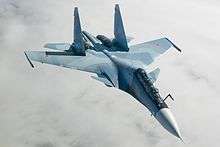


- Algerian Air Force has 58 Su-30MKAs in service[59][60][61]
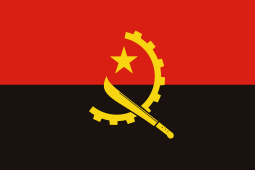
- Angolan Air Force ordered 12 Su-30K fighters on 16 October 2013 as part of a $1 billion deal that also included other equipment and maintenance services for the country. The Su-30Ks were initially delivered to India in the 1990s, but were returned to Russia in 2007.[62] Angola received the first 2 aircraft in September 2017.[63][64]

- People's Liberation Army Air Force operates the Su-30MKK variant. The People's Liberation Army Naval Air Force operates the Su-30MK2 variant. As of 2012 China operates 76 Su-30MKK and 24 Su-30MK2.[28]

- Belarusian Air Force has ordered 12 Su-30SM fighters, originally to be delivered in 2018, but delayed to 2019.[65][66]

- Indian Air Force operates the Su-30MKI variant. Russia built the early Su-30MKIs; later Su-30MKIs are manufactured and assembled indigenously under license by Hindustan Aeronautics Limited. As of October 2017, 240 Su-30MKIs are in service.[67]

- Indonesian Air Force (TNI – AU or Tentara Nasional Indonesia – Angkatan Udara) has ordered a combined 11 Su-30MK/MK2 fighters.[68] As of September 2013 it has all Su-30MK/MK2s in inventory.[68]

- Kazakh Air Force ordered Su-30SM fighters in February 2015.[69] The first 4 aircraft were delivered in June 2015.[70] Another 2 aircraft were delivered in December 2016.[71] The second order for 12 aircraft was signed in August 2017.[72][73] The first 2 aircraft of the second order were delivered in late December 2017.[74] New contract for 8 more aircraft was signed in May 2018.[75]

- The Royal Malaysian Air Force ordered 18 Su-30MKMs in May 2003. The first 2 Su-30MKMs were formally handed over in Irkutsk on 23 May 2007 and arrived in Malaysia at Gong Kedak airbase in Terengganu on 21 June 2007.[76] As part of the contract agreement, Russia sent the first Malaysian cosmonaut to the International Space Station in October 2007.[77] Malaysia has 18 Su-30MKMs in service as of 2014.[78]

- Myanmar Air Force 6 Su-30SMEs ordered in January 2018.[79][80][81]

- Russian Air Force has 3 Su-30s and 20 Su-30M2 (all delivered)[82] and 90 Su-30SM fighters as of September 2018 with 8 delivered to Russian Knights aerobatic team.[83][84][85][86][87][88][89][90][91][92][93][94][95] An order for 28 Su-30SM fighters was placed in April 2016, which is to increase the total of the variant to 88, with deliveries to be completed by 2018.[96]
- Russian Naval Aviation – 28 Su-30SMs on order,[97] with 50 planned.[98] 22 aircraft were delivered as of July 2018.[99]

- Ugandan Air Force ordered 6 Su-30MK2s in 2010.[100][101] The last 2 aircraft from the order were delivered in June 2012.[102]

- Venezuelan Air Force and the government of Venezuela announced on 14 June 2006 the purchase of 24 units of the Su-30MK2. The first 2 Su-30MK2s arrived in early December 2006 while another 8 were commissioned during 2007; 14 more units arrived in 2008.[103][104] A second batch of 12 Su-30MKV was also being considered in 2009.[24] It has 24 Su-30MK2s as of January 2012.[105] In October 2015, Venezuela announced the purchase of 12 more Su-30MK2 from Russia for $480 million.[106][107]

- Vietnam People's Air Force operates 4 Su-30MKs and 20 Su-30MK2Vs in 2013.[28] On 21 August 2013, Russia announced it would deliver another batch of 12 Su-30MK2s under a $450 million contract, with deliveries in 2014–2015.[108]
Specifications (Su-27PU/Su-30)

Data from KnAAPO,[12] Sukhoi,[13] Gordon and Davison,[109] deagel.com,[110] airforce-technology.com[111]
General characteristics
- Crew: 2
- Length: 21.935 m (73 ft)
- Wingspan: 14.7 m (48 ft 3 in)
- Height: 6.36 m (20 ft 10 in)
- Wing area: 62 m² (667 ft²)
- Empty weight: 17,700 kg (39,021 lb)
- Loaded weight: 24,900 kg (54,900 lb) with 56% fuel
- Max. takeoff weight: 34,500 kg (76,060 lb)
- Fuel capacity: 9,400 kg (20,724 lb) internally[112]
- Powerplant: 2 × Saturn AL-31FL turbofans
- Dry thrust: 74.5 kN (16,750 lbf) each
- Thrust with afterburner: 122.58 kN (27,560 lbf) each
Performance
- Maximum speed: Mach 2.0 (2,120 km/h; 1,320 mph) at altitude
- Range: 3,000 km (1,860 mi; 1,620 nmi) at altitude
- Service ceiling: 17,300 m (56,800 ft)
- Rate of climb: 230 m/s (45,275 ft/min)
- Wing loading:
- With 56% fuel: 401 kg/m² (82.3 lb/ft²)
- With full internal fuel: 468.3 kg/m² ()
- Thrust/weight:
- With full fuel: 0.86
- With 56% fuel: 1
- Maximum g-load: +9 g
Armament
- Guns: 1 × 30 mm Gryazev-Shipunov GSh-30-1 autocannon with 150 rounds
- Hardpoints: 12 hardpoints with a capacity of up to 8,000 kg (18,000 lb) and provisions to carry combinations of:
- Rockets:
- Missiles:
- Bombs:
- KAB-500KR general-purpose bomb
- KAB-500OD bomb
- KAB-1500KR GP bomb
- KAB-1500L laser-guided bomb
- FAB-500T GP bomb
- BETAB-500SHP bomb
- ODAB-500PM bomb
- OFAB-250-270 bomb
- OFAB-100-120 bomb
- P-50T bomb
- RBK-500 cluster bombs
- SPBE-D bomb
- Rockets:
Avionics
- Bars planar array radar
- OEPS-27 electro-optical targeting system
- SPO-15 Radar Warning Receiver
Accidents
- 12 June 1999: Paris Air Show, Le Bourget, France, a Russian Su-30MK crashed – both pilots ejected safely and no one was hurt on the ground.[113]
- 17 September 2015: a Venezuelan Air Force Su-30MK2 crashed in Southern Venezuela, near the town of Elorza while intercepting a small drug-smuggling aircraft.[114] Both pilots died.
- 3 May 2018: a Russian Su-30SM crashed off the coast of Syria’s Jabla. Accident occurred after take off.[115] Both pilots died.
See also
Related development
Aircraft of comparable role, configuration and era
- Boeing F/A-18E/F Super Hornet
- McDonnell Douglas F-15E Strike Eagle
- Dassault Rafale
- Eurofighter Typhoon
- Mikoyan MiG-35
Related lists
References
- ↑ "Su-30MK page". Sukhoi. Archived from the original on 13 July 2011. Retrieved 3 July 2011.
- ↑ "Zbog čega Srbija neće Suhoje?". TangoSix.rs. July 25, 2013.
- ↑ "Delivery of Su-30 MKI Fighters for IAF to get Delayed Due to HAL's Limited Assembly Line". Archived from the original on 22 February 2014.
- ↑ "Russian Air Force to Get 21 Su-30 Fighter Jets in 2014". RIA Novosti. 2014-02-13.
- 1 2 The Military Balance 2017
- 1 2 "Поставки боевых самолетов в Вооруженные Силы России в 2017 году". Retrieved 24 March 2018.
- ↑ Sputnik (21 August 2013). "Russia to Deliver 12 Su-30 Fighter Jets to Vietnam – Source". rian.ru. Retrieved 1 April 2015.
- ↑ "Russia-Libya in billion-dollar arms deal". Moscow Top News. Retrieved 2014-04-06.
- ↑ Słupsk, Mariusz Wojciechowski. "Project T-10PU Heavy interceptor fighter Su-27PU (Su-30)".
- ↑ Greg Goebel/chapter 2 of 2/ public domain. "Second-Generation Su-27s & Derivatives". Retrieved February 17, 2014.
- ↑ "Discovering Novel Fighter Combat Maneuvers" (PDF). Retrieved 2012-05-17.
- 1 2 Sukhoi Su-30MK Archived 24 April 2008 at the Wayback Machine.. KNAAPO.
- 1 2 "Su-30MK: Aircraft performance". Sukhoi. Archived from the original on 16 July 2011. Retrieved 3 July 2011.
- ↑ "На авиабазе "Хмеймим" в Сирии размещены российские истребители Су-30СМ". РИА Новости.
- ↑ Sputnik. "Perfect Synergy: Su-30SMs Helped Russian Bombers Lock Targets in Syria". sputniknews.com. Retrieved 24 March 2018.
- ↑ "Su-30SM fighters in Syria for war". AirForceWorld.com.
- ↑ Cencoti, David. "These photos of everyday life at Hmeymim say a lot about the Russian Air Force operations in Syria". The Aviationist. The Aviationist. Retrieved 23 December 2015.
- ↑ "RuAF Su-30SM Providing Air Support For SAA". Liveleak.com. Retrieved 24 March 2018.
- ↑ http://amp.timeinc.net/thedrive/the-war-zone/20602/russian-su-30sm-fighter-jet-crashed-off-the-syrian-coast-killing-both-crew?source=dam. Missing or empty
|title=(help) - ↑ Niels Hillebrand. "MILAVIA Aircraft – Sukhoi Su-30 Multi-Role Flankers". milavia.net. Retrieved 1 April 2015.
- ↑ "Armenia may acquire Russia-made Iskander-M missiles, Su-30 fighters". Reuters. Retrieved 23 May 2016.
- ↑ Jennings, Gareth (10 February 2016). "Russia and Belarus agree Su-30 deal". Jane's Defence Weekly. Surrey, UK: Jane's Information Group. 53 (14). ISSN 0265-3818.
- ↑ "Russia to sign contract this year to sell Su-30SM fighter jets to Iran". Reuters. 2018-06-13. Retrieved 17 February 2016.
- 1 2 Sukhoi Su-27 – Operator List. MilAvia.net, 14 March 2009.
- ↑ "Belarus may buy outdated Su-30 fighters from Russia".
- ↑ "Sukhoi SU-30M technical data". 16 November 2011.
- ↑ "SU30MKI". Aircraftinaction.co.uk. Archived from the original on 18 January 2012. Retrieved 17 May 2012.
- 1 2 3 "Sukhoi Su-30 story in colours. Sukhoi Su-30 fighter worldwide camouflage and painting schemes. Prototypes, experimental planes, variants, serial and licensed production, deliveries, units, numbers. Russia, India, China, Malaysia, Venezuela, Belarus, Ukraine, Algeria, Vietnam, Eritrea, Angola, Uganda". mars.slupsk.pl. Retrieved 1 April 2015.
- ↑ "The Hindu : India, Russia to make fighter variant for Malaysia". hinduonnet.com. Retrieved 1 April 2015.
- ↑ "Archived copy" (PDF). Archived from the original (PDF) on 9 December 2014. Retrieved 21 January 2015.
- ↑ "The first two serially produced Su-30MKM fighters for the Royal Malaysian Air Force has been demonstrated" (Press release). Irkut Corporation. 24 May 2007. Archived from the original on 7 March 2008.
- ↑ Karnozov, Vladimir. "Russian air force orders thrust-vectoring Su-30SM fighters". Flight International, 21 July 2011.
- 1 2
- ↑ "Sukhoi Su-30SM An Indian Gift to Russia's Air Force." en.ria.ru. Retrieved: 30 September 2012.
- ↑ "The Aviationist » Satellite image shows four Russian Su-30SM parked in the open air at airfield in Syria". The Aviationist.
- ↑ Sputnik (4 September 2015). "Russia's Black Sea Fleet in Crimea Receives SU-30SM Fighters".
- ↑ "bellingcat – Russian SU-30SM in Syria, not SU-27 – bellingcat". bellingcat.
- ↑ "Here's a stunning video (including cockpit footage) of the awesome Sukhoi Su-30SM". The Aviationist.
- ↑ "Fighter generations comparison chart". The Aviationist.
- ↑ "Air Force Magazine". googleusercontent.com. Archived from the original on 3 March 2016. Retrieved 17 September 2015.
- ↑ "Russia's Su-30SM to be showcased at KADEX-2014". Global Aviation Report. Retrieved 1 April 2015.
- 1 2 "Archived copy" (PDF). Archived from the original (PDF) on 4 September 2014. Retrieved 21 January 2015.
- ↑ "Russia's new air force is a mystery". The Week. Retrieved 1 April 2015.
- ↑ "Archived copy" (PDF). Archived from the original (PDF) on 9 September 2014. Retrieved 21 January 2015.
- ↑ "Archived copy" (PDF). Archived from the original (PDF) on 5 September 2014. Retrieved 21 January 2015.
- ↑ http://www.airrecognition.com/index.php/archive-world-worldwide-news-air-force-aviation-aerospace-air-military-defence-industry/global-defense-security-news/global-news-2018/july/4369-kursk-air-regiment-receives-new-su-30sm-fighter-jets.html
- ↑ "Kursk Air Regiment receives new Su-30SM fighter jets". airrecognition.com. 4 July 2018. Retrieved 8 July 2018.
- ↑ "Russian Su-30SMs to be fitted with SAP-518 jamming pods following Syrian experience". airecognition.com. 29 June 2018. Retrieved 8 July 2018.
- ↑ "Russian Military to Get 30 More Su-30SM Fighter Jets". RIA Novosti. 2012-12-19.
- ↑ Reed Business Information Limited. "PICTURES: Irkut launches Su-30SM test campaign". Flight Global. Retrieved 1 April 2015.
- ↑ "Su-30SM fighter jet officially accepted into VVS service". airrecognition.com. 6 March 2018. Retrieved 8 July 2018.
- ↑ RGareth Jennings. "Singapore Airshow 2016: Russia reveals new Su-30SME 'Flanker' fighter". Janes Defence. Retrieved 19 Feb 2016.
- ↑ MKK stands for Russian Mnogofunktzionniy Kommercheskiy Kitayski (Cyrillic: Многофунктзионний Коммерческий Китайски), "Multifunctional Commercial for China".
- ↑ Russia, Vietnam ink submarine, arms deal, spacewar.com, 2009-12-21, accessed 22 December 2009.
- ↑ "First serial Su-30M2 completed test flights" (Press release). Sukhoi. 28 September 2010. Archived from the original on 24 July 2011. Retrieved 3 July 2011.
- ↑ "Su-27 Flanker Variants Overview". Milavia, 18 February 2010.
- ↑ "Airbase in Krasnodar region will accommodate ten Su-30M2". Lenta.ru. Retrieved 2012-05-17.
- 1 2 "bmpd". livejournal.com. Archived from the original on 10 August 2014. Retrieved 1 April 2015.
- ↑ "IHS Jane's 360: Algerian Su-30MK order stokes Russian industry rivalry". Jane's. Retrieved 17 September 2015.
- ↑ "Algeria receives eight Su-30MKI(A) multirole fighters from Russia". Defence Blog. Retrieved 2 January 2017.
- ↑ "TASS: Military & Defense – Russia, Algeria sign contract for 14 Su-30MKA aircraft". TASS. Retrieved 17 September 2015.
- ↑ Angola Inks $1Bln Arms Deals With Russia – Rian.ru, 16 October 2013
- ↑ "Ангола получила два первых истребителя Су-30К". Live Journal (in Russian). 20 September 2017. Archived from the original on 22 September 2017. Retrieved 22 September 2017.
- ↑ Binnie, Jeremy (20 September 2017). "Angola receives first Su-30K fighters". IHS Jane's 360. Archived from the original on 22 September 2017. Retrieved 22 September 2017.
- ↑ "Подробности: Беларусь купит 12 истребителей Су-30СМ за российский кре". Белорусский партизан. Retrieved 24 March 2018.
- ↑ "Delivery of Su-30SM fighter jets to Belarus postponed to 2019". Air Recognition. 15 February 2018. Archived from the original on 15 February 2018. Retrieved 17 February 2018.
- ↑ "IAF Plans to Upgrade Su-30MKI Fighters With Advanced Radar, Missiles". india.com. 24 October 2017. Retrieved 1 November 2017.
- 1 2 "Indonesia's Air Force Adds More Flankers". Defense Industry Daily, 10 May 2013.
- ↑ "Kazakhstan to acquire Su-30SM fighters". Jane's Information Group. 4 February 2015. Archived from the original on 21 November 2015. Retrieved 29 December 2017.
- ↑ "Kazakhstan Has Received Four Russian SU-30SM Fighters". bellingcat. 30 June 2015. Retrieved 23 August 2015.
- ↑ "Партия истребителей Су-30СМ прибыла в Казахстан". armstrade.org. 27 December 2016. Retrieved 13 September 2017.
- ↑ "Казахстан закупает в России еще 12 истребителей Су-30СМ". bmpd. 13 September 2017. Retrieved 13 September 2017.
- ↑ "Russia, Kazakhstan sign contract for supply of 12 Su-30SM jets". TASS. Moscow. 12 September 2017. Archived from the original on 13 September 2017. Retrieved 13 September 2017.
- ↑ "Казахстан получил еще два истребителя Су-30СМ". bmpd. 28 December 2017. Retrieved 29 December 2017.
- ↑ "Russia's aircraft corporation to deliver Su-30SM fighter jets to Kazakhstan". TASS. 24 May 2018. Retrieved 26 May 2018.
- ↑ The Malaysia Deal: Offsets & Updates. defenseindustrydaily.com
- ↑ Soyuz spacecraft takes first Malaysian into space Archived 21 July 2010 at the Wayback Machine.. RT.com
- ↑ Reed Business Information Limited. "AirSpace". flightglobal.com. Retrieved 1 April 2015.
- ↑ "Moscow to deliver six Su-30 fighter aircraft to Myanmar". TASS. Naypyidaw, Myanmar. 22 January 2018. Archived from the original on 22 January 2018. Retrieved 22 January 2018.
- ↑ Osborn, Andrew; Ostroukh, Andrey (22 January 2018). "Russia to sell six SU-30 warplanes to Myanmar: RIA". Reuters. Moscow. Archived from the original on 22 January 2018. Retrieved 22 January 2018.
- ↑ "Новые подробности о закупке Мьянмой истребителей Су-30СМЭ". bmpd. 23 January 2018. Retrieved 24 January 2018.
- ↑ "Archived copy". Archived from the original on 10 April 2016. Retrieved 10 April 2016.
- ↑ bmpd (9 October 2016). "Группа "Русские Витязи" получила четыре самолета Су-30СМ". Retrieved 24 March 2018.
- ↑ bmpd (8 December 2016). "Четыре морских Су-30СМ идут на запад". Retrieved 24 March 2018.
- ↑ bmpd (30 November 2016). ""Русские Витязи" полностью укомплектовали группу новыми самолетами Су-30СМ". Retrieved 24 March 2018.
- ↑ bmpd (29 December 2016). "Два истребителя Су-30СМ прибыли на Северный флот". Retrieved 24 March 2018.
- ↑ bmpd (5 June 2017). "14-й гвардейский истребительный авиационный полк получил первые два истребителя Су-30СМ". Retrieved 24 March 2018.
- ↑ bmpd (30 July 2017). "В состав 14-го гвардейского истребительного авиационного полка прибыли еще два истребителя Су-30СМ". Retrieved 24 March 2018.
- ↑ bmpd (12 September 2017). "14-го гвардейский истребительный авиационный полк получил еще два истребителя Су-30СМ". Retrieved 24 March 2018.
- ↑ bmpd (4 October 2017). "Еще два истребителя Су-30СМ идут в 14-й гвардейский истребительный авиационный полк". Retrieved 24 March 2018.
- ↑ bmpd (28 October 2017). "Еще два новых Су-30СМ идут в Курск". Retrieved 24 March 2018.
- ↑ bmpd (10 December 2017). "14-й гвардейский истребительный авиационный полк получил еще три истребителя Су-30СМ". Retrieved 24 March 2018.
- ↑ bmpd (1 May 2018). "Четыре новых истребителя Су-30СМ поступили в Курск". Retrieved 1 May 2018.
- ↑ bmpd (1 July 2018). "14-й гвардейский истребительный авиационный полк в Курске получил еще два истребителя Су-30СМ". Retrieved 5 July 2018.
- ↑ "Звено истребителей Су-30СМ вошло в боевой состав авиаполка ЗВО в Курской области". mil.ru. 10 September 2018. Retrieved 10 September 2018.
- ↑ Ведомости (3 April 2016). "Министерство обороны России получит 36 истребителей Су-30СМ". Retrieved 24 March 2018.
- ↑ "Вооруженные силы до конца 2018 года получат еще 55 истребителей Су-30СМ". 15 June 2016. Retrieved 24 March 2018.
- ↑ "Минобороны и «Иркут» подписали контракт на поставку первых истребителей Су-30СМ для ВМФ". flotprom.ru.
- ↑ "Два новых Су-30СМ прибыли на Балтийский флот". bmpd.livejournal.com. 2 July 2018. Retrieved 3 July 2018.
- ↑ "Russia signs $1.2 bln contract for jet fighter delivery to Algeria, Uganda | Russia". RIA Novosti. Retrieved 2012-05-17.
- ↑ Tabu Butagira, Martin Ssebuyira, "New Russian-built jet fighters arrive". Daily Monitor (13 July 2011).
- ↑ "Uganda receives final Su-30s from Russia". DefenceWeb. 7 June 2012. Retrieved 2 September 2013.
- ↑ Air Forces Monthly, August 2006 issue.
- ↑ Chavez warns U.S. after getting Russian warplanes. RIA Novosti,
- ↑ "World Military Aircraft Inventory". 2012 Aerospace. Aviation Week and Space Technology, January 2012.
- ↑ "Venezuela allocates $480m to buy Sukhoi aircraft from Russia". airforce-technology.com. Retrieved 2 November 2015.
- ↑ "Pese a la crisis económica, Venezuela compra doce cazas rusos". Clarín. 29 October 2015. Retrieved 2 November 2015.
- ↑ Russia to Deliver 12 Su-30 Fighter Jets to Vietnam – Source – Rian.ru, 21 August 2013
- ↑ Gordon and Davison 2006, pp. 92, 95–96.
- ↑ "Su-30". www.deagel.com. Retrieved 24 March 2018.
- ↑ "Su-30M Flanker-H Air-Superiority Fighter – Airforce Technology". Retrieved 24 March 2018.
- ↑ "Su-30M Flanker-H Air-Superiority Fighter – Airforce Technology". airforce-technology.com. Retrieved 1 April 2015.
- ↑ Gordon, Yefim & Davidson, Peter. 2006. "Sukhoi Su-27 Flanker", p. 46. Warbird Tech Series, vol. 42. ISBN 978-1-58007-091-1.
- ↑ "Venezuela's Maduro Confirms 2 Deaths in Fighter Jet Crash".
- ↑ "Russian Su-30SM fighter jet crashes in Syria".
- Gordon, Yefim and Peter Davison. Sukhoi Su-27 Flanker. Specialty Press, 2006. ISBN 978-1-58007-091-1.
Further reading
- Eden, Paul (ed.). The Encyclopedia of Modern Military Aircraft. London, UK: Amber Books, 2004. ISBN 1-904687-84-9.
- Gordon, Yefim. Sukhoi Su-27 Flanker: Air Superiority Fighter. Airlife Publishing, 1999. ISBN 1-84037-029-7.
- Williams, Mel (ed.). "Sukhoi 'Super Flankers'". Superfighters: The Next Generation of Combat Aircraft. Norwalk, Connecticut: AIRtime Publishing Inc., 2002. ISBN 1-880588-53-6.
External links
| Wikimedia Commons has media related to: |
- Su-30MK page on Sukhoi.org
- Su-30 page on Milavia.net
- Su-30 page on GlobalSecurity.org
- Sukhoi Su-30MK Su-30MKM fighter aircraft page on Air recognition site
- Sukhoi Flankers – The Shifting Balance of Regional Air Power
- Su-27 Series at Greg Goebel's AIR VECTORS
- Su-30 page on Fighter Tactics Academy site
- Asia's Advanced Flankers on ausairpower.net
- Sukhoi Su-30 photo pool on Flickr
- YouTube video, Su-30 videos on patricksaviation.com, Su-30 videos on flightlevel350.com
- Malaysian SU-30MKM image on airliners.net
- Sukhoi Su-30 story in colours at mars.slupsk.pl